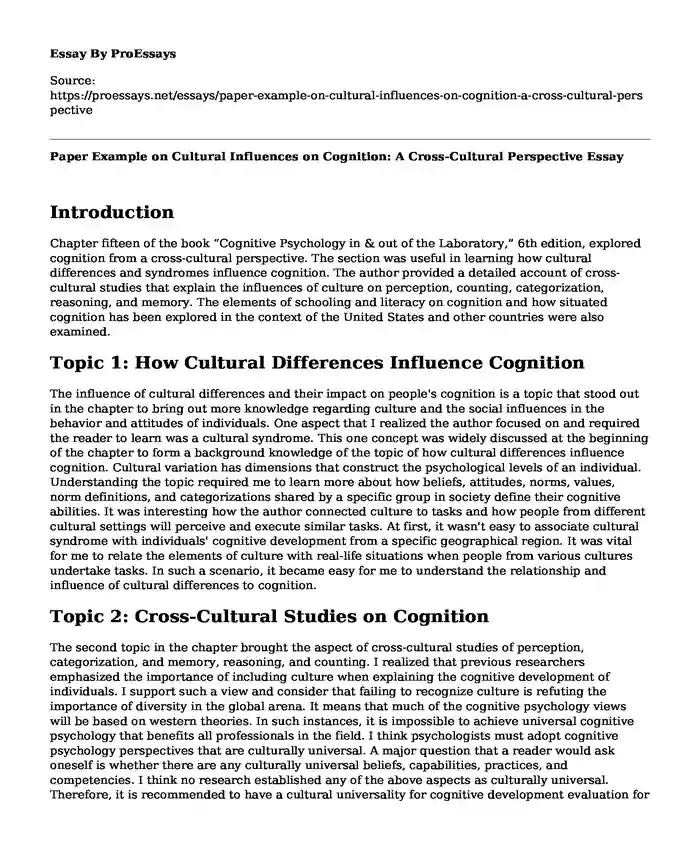Introduction
Chapter fifteen of the book “Cognitive Psychology in & out of the Laboratory,” 6th edition, explored cognition from a cross-cultural perspective. The section was useful in learning how cultural differences and syndromes influence cognition. The author provided a detailed account of cross-cultural studies that explain the influences of culture on perception, counting, categorization, reasoning, and memory. The elements of schooling and literacy on cognition and how situated cognition has been explored in the context of the United States and other countries were also examined.
Topic 1: How Cultural Differences Influence Cognition
The influence of cultural differences and their impact on people's cognition is a topic that stood out in the chapter to bring out more knowledge regarding culture and the social influences in the behavior and attitudes of individuals. One aspect that I realized the author focused on and required the reader to learn was a cultural syndrome. This one concept was widely discussed at the beginning of the chapter to form a background knowledge of the topic of how cultural differences influence cognition. Cultural variation has dimensions that construct the psychological levels of an individual. Understanding the topic required me to learn more about how beliefs, attitudes, norms, values, norm definitions, and categorizations shared by a specific group in society define their cognitive abilities. It was interesting how the author connected culture to tasks and how people from different cultural settings will perceive and execute similar tasks. At first, it wasn't easy to associate cultural syndrome with individuals' cognitive development from a specific geographical region. It was vital for me to relate the elements of culture with real-life situations when people from various cultures undertake tasks. In such a scenario, it became easy for me to understand the relationship and influence of cultural differences to cognition.
Topic 2: Cross-Cultural Studies on Cognition
The second topic in the chapter brought the aspect of cross-cultural studies of perception, categorization, and memory, reasoning, and counting. I realized that previous researchers emphasized the importance of including culture when explaining the cognitive development of individuals. I support such a view and consider that failing to recognize culture is refuting the importance of diversity in the global arena. It means that much of the cognitive psychology views will be based on western theories. In such instances, it is impossible to achieve universal cognitive psychology that benefits all professionals in the field. I think psychologists must adopt cognitive psychology perspectives that are culturally universal. A major question that a reader would ask oneself is whether there are any culturally universal beliefs, capabilities, practices, and competencies. I think no research established any of the above aspects as culturally universal. Therefore, it is recommended to have a cultural universality for cognitive development evaluation for different people.
Topic 3: The Effects of Schooling and Literacy on Cognition
I found the third topic in the chapter very sensitive when it comes to the development of cognition. I think the author was more concerned to show how literacy and schools contribute to one’s ability to develop cognition better. In that case, an assumption is that schooling and literacy increases or changes cognition. The aspect of culture is explored in the dimension of whether schooling is a global aspect that promotes cultural diversity on cognitive development. I think the elements of schooling and literacy are essential in changing individuals' thought processes irrespective of their culture. One can connect schooling and literacy with achieving culturally diverse cognitive development views. The thought process of a human being changes fundamentally after becoming literate. I would say that schooling and literacy contribute to cognitive development by supporting logical and abstract thinking in a manner that connects with oral and written language.
Conclusion
In conclusion, the final chapter of the given reading, “Cognitive Psychology in & out of the Laboratory,” 6th edition, was educative in cognitive psychology. I gained a lot of knowledge regarding the influence of cultural differences on cognition. All the examined aspects are applicable in all areas of cognitive psychology. They are helpful to me as a professional in the field to realize the importance of culturally diverse cognitive development for all people of the world.
Reference
Galotti, K. (2017). Cognitive psychology in and out of the laboratory. 6th Edition. Sage Publications, Inc. ISBN13: 9781506351568
Cite this page
Paper Example on Cultural Influences on Cognition: A Cross-Cultural Perspective. (2023, Sep 28). Retrieved from https://proessays.net/essays/paper-example-on-cultural-influences-on-cognition-a-cross-cultural-perspective
If you are the original author of this essay and no longer wish to have it published on the ProEssays website, please click below to request its removal:
- Personality Theory in the Media
- Essay Sample on Mental Disorders
- Essay Sample on Technology and Mental Health: Effects on Children
- Essay Example on Older Adults: Mental Health Challenges & Health Promotion
- Essay Sample on 5 Key Elements of Emotional Intelligence for Leaders
- Essay Example on Evolution of Diversity in the US Labor Industry: My Experience
- Essay Example on Aging Stereotypes and Their Impact on Society: Jared Diamond's Argument







